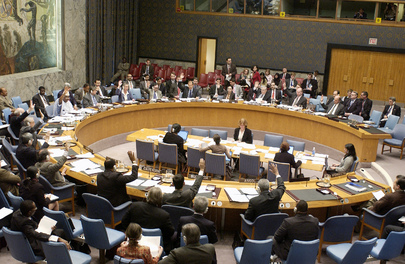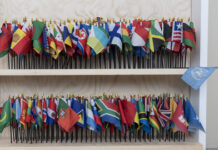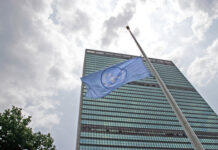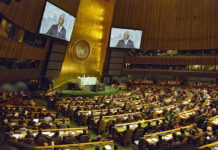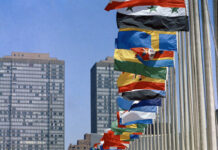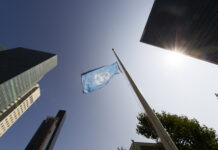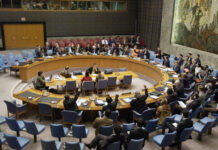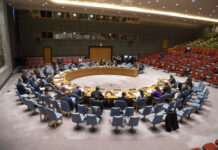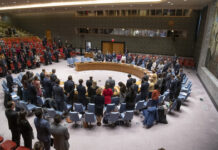This is the News in Brief from the United Nations.
Gaza: Northern aid push frustrated as regional tensions rise
UN humanitarians reported on Monday that a food convoy in Gaza had been hit by shelling after a deadly weekend of hostilities in Gaza in which at least 234 Palestinians were reportedly killed, stoking regional tensions in the Middle East.
“This morning a food convoy waiting to move into northern Gaza was hit by Israeli naval gunfire; thankfully no-one was injured,” said Tom White, Director of Affairs for the UN agency for Palestinian refugees, UNWRA.
Accompanying the post on X, formerly Twitter, two photographs showed a stationary flat-bed lorry with a gaping hole where part of its cargo and protective tarpaulin had been.
Several boxes of relief supplies lay scattered on the roadside but it was not immediately clear what they contained nor where the lorry was.
UNRWA’s bid to reach the beleaguered north came as the UN World Food Programme (WFP) said that it, too, had been unable to reach northern Gaza City for the third time last Friday.
The UN agency reported that it had only managed to send four convoys in the month of January, that’s around 35 truckloads of food – enough for almost 130,000 people, which was “not enough to prevent a famine” which is where hunger levels in Gaza are reaching now.
UN migration agency, top rights experts spotlight deepening Sudan crisis
A staggering 25 million people need humanitarian assistance in Sudan and 14 million of them are children.
That’s the urgent message from the UN migration agency IOM and top rights experts who on Monday backed global calls for a ceasefire, warning that “every moment of continued violence, puts more lives at risk”.
Heavy fighting that erupted last April between rival forces and spread across Sudan has pushed more than 1.7 million people into neighbouring countries and uprooted some 10 million in total.
Egypt alone hosts more than 415,000 people where IOM helps Sudan’s displaced to rebuild their lives, like Mohammed.
He fled the capital, Khartoum, taking a dangerous bus journey to Egypt last May. It took two days, during which time he saw “unimaginable horrors” including homes shot at or burned.
Today, Mohammed remains deeply worried about his relatives who are trapped by fighting in Al Fashir in Northern Darfur.
Echoing those concerns, top rights experts who report to the Human Rights Council in Geneva said that almost four in 10 people in Sudan now face acute hunger – 17.7 million in all.
The Special Rapporteurs and Independent Experts warned that the ongoing conflict had worsened communal tensions.
Equally concerning are the lack of resources and lack of international aid, which have “significantly increased the risk of violence between host communities and IDPs”, the rights experts said, referring to internally displaced people.
They warned that the elderly, people with disabilities, women and girls are “falling victims of targeted attacks by the members of the host community”.
In a statement, IOM insisted that aid “must reach the millions in need. People must be able to access food, fuel, medicines and other critical supplies and services. People trying to flee, and access assistance should be able to do so safely.”
AI boom facilitates child abuse via the Internet, warns right expert
Since 2019, the volume of reported child sexual abuse material online has increased by 87 per cent, a top UN-appointed human rights expert has warned.
In a call for more action to eradicate child exploitation online, the UN Special Rapporteur on (the) sale and sexual exploitation of children, Mama Fatima Singhateh, said that generative AI and eXtended Reality software had made the problem worse.
It is now possible to create computer-generated “deepfakes” and so-called “deepnudes” and distribute them encrypted and without built-in safety mechanisms, the Special Rapporteur said.
And ahead of Safer Internet Day on 6 February, Ms. Singhateh alleged that the private sector and big tech were “less reliable” than they had promised to be, “with serious ingrained biases, flaws in programming and surveillance software to detect child abuse”, (and a) failure to crack down on child sexual abuse and exploitation networks.
The Special Rapporteur welcomed the UN Secretary-General’s AI Advisory Body which is tasked with making recommendations for the establishment of an international agency to govern and coordinate Artificial Intelligence.
And she also insisted that governments and companies should “work together to solve the issue of child abuse, by including the victims’ voices “in the design and development of ethical digital products to foster a safer online environment”.
Daniel Johnson, UN News.
Source of original article: United Nations (news.un.org). Photo credit: UN. The content of this article does not necessarily reflect the views or opinion of Global Diaspora News (www.globaldiasporanews.com).
To submit your press release: (https://www.globaldiasporanews.com/pr).
To advertise on Global Diaspora News: (www.globaldiasporanews.com/ads).
Sign up to Global Diaspora News newsletter (https://www.globaldiasporanews.com/newsletter/) to start receiving updates and opportunities directly in your email inbox for free.


